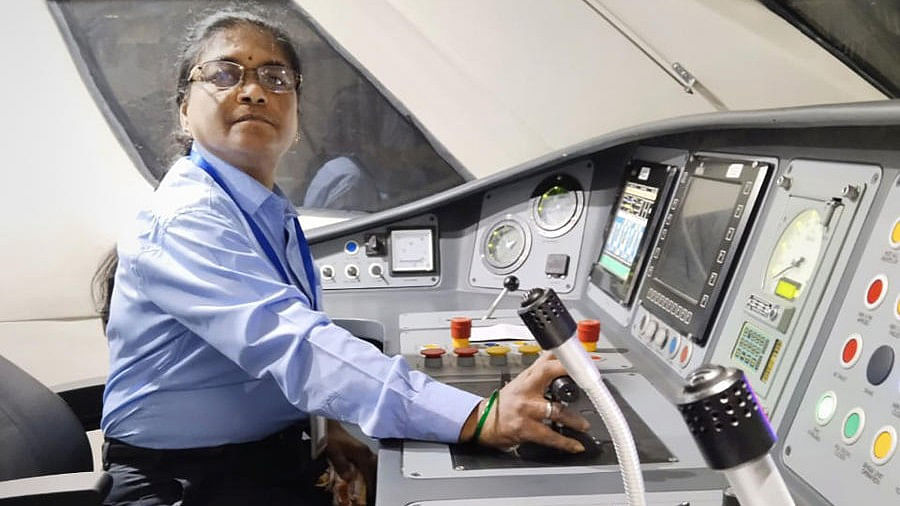
Asia's first female loco pilot Surekha Yadav operates Solapur-CSMT Vande Bharat Express train.
Credit: PTI File Photo
While counselling Class 10 students in a school, I found this young girl from a conservative family with a sparkle in her eyes. Her dream was to be an airline pilot, but her family wouldn’t allow her to pursue that career. Upset with this, she resigned to her fate, thinking she would pursue some ordinary undergraduate course before getting married. A deeper prodding showed that the family was not against her having a career. However, they were worried about the risks, odd timings and other issues. She felt positive about a career in the aviation sector as a ground staff or in the technical cadre, when it was suggested.
Certain biases about certain careers make people feel they are suitable only for a specific gender, though women the world over have proven such limitations wrong. Counsellors and educators must help students discover their potential irrespective of gender or societal expectations. Such stereotypes can creep into children’s minds over the years and may impact their career choices. Career choices must always be based on skills, aptitude, and prospects rather than society's standards.
Understanding gender stereotypes
Centuries-long conditioning, fear of standing out of the crowd, and blind acceptance have rigidified gender stereotypes. Media programmes, especially entertainment, and social and religious conditioning have strengthened these. Despite this, today, women have come out of the vortex of pursuing jobs only in nurturing fields like teaching and nursing, formal sectors like banking or administration, or, at the most, entry-level management roles. The complex core jobs in technology, heavy manufacturing, automobiles, and the armed forces remain populated mainly by men, though there are very few restrictions to entry for women.
We still find high school and pre-university female students who love science and technology hesitant to opt for civil or mechanical engineering, not for want of opportunities but for the perceived ‘tough’ nature of the work expectations in the future. Similarly, boys who would love to pursue careers in nursing, fashion, culinary sciences, beauty and the like would be encouraged to take up more ‘masculine’ careers, again, with scores of them who have been successful pursuing just that and making way for others to follow suit.
This dilemma is clearly visible during counselling after an aptitude test when parents start dominating the discussion when results don’t match their expectations. Such kids may heed others’ suggestions and lose their true potential.
How can we motivate students to pursue careers they would love for life?
Role models: Schools and families can expose students to role models that defy gender stereotypes. Women air traffic controllers, police officers, mechanics, cab drivers, or men as nursery teachers, nurses, and craftspersons are ideal role models to showcase what a passionate person with the proper training can accomplish. When you choose the path you love most, you strive to excel in it much better. Organising workshops, visits, or meet-and-greet sessions helps.
Right counselling: A counsellor can bring out the best in a student’s aptitude through scientific tests and explain why pursuing that field could be a better idea. Exposing students to non-traditional career choices, spending time with people from that field or gaining information about such professionals helps loosen the rigidity behind gender stereotypes. Diversity has been proven to foster innovation and teamwork in workplaces.
Parents leading by example: Kids from homes where roles are not defined by gender are raised to become more open to careers from diverse streams. Seeing your father work in the kitchen, cleaning the house, helping with raising babies or the mother driving a car, repairing the leaking taps and paying bills can help kids understand that no work is restricted to either men or women. It is also necessary that the community supports this view to bolster what parents demonstrate at home.
Role of media and social media: Today, media showcases professionals who transcend gender boundaries. Social media has helped bypass traditional media in that a person can showcase his or her work directly to the audience. When kids see such role models, they are encouraged to pursue their passions without the burden of expectations.
Certain roles could be demanding for certain persons irrespective of gender, and it is at such times that families and the community at large can pitch in. For example, a young girl must feel comfortable that she can avail of maternity leave even when she can work in the armed forces or that a man can pitch his business idea before a female venture capitalist when the situation demands, without feeling out of place. Normalising our inherent strengths and weaknesses arising from diversity can make it easier for students to spread their wings and fly high.